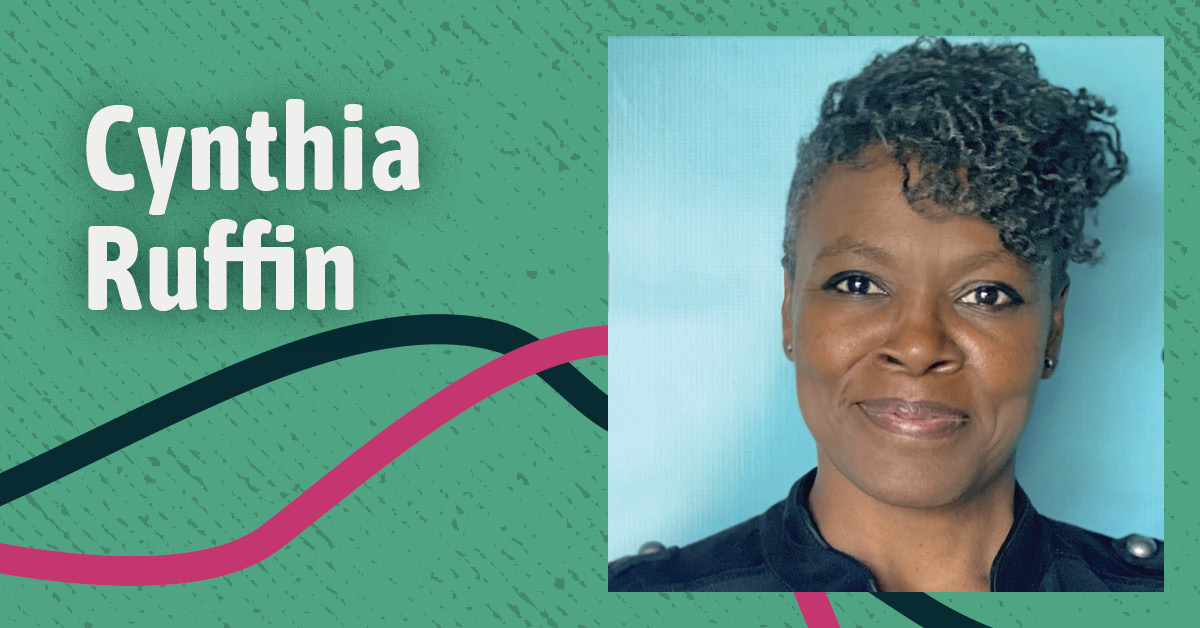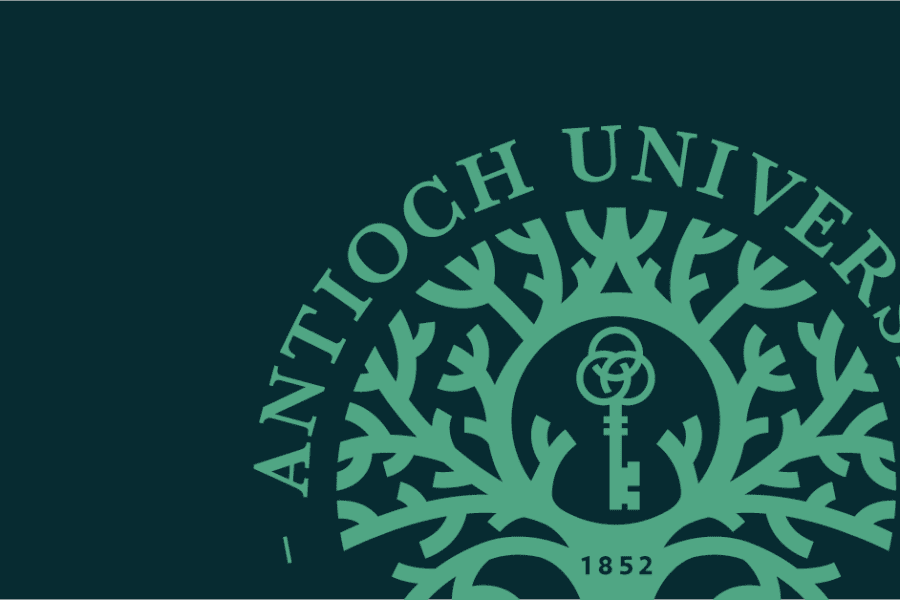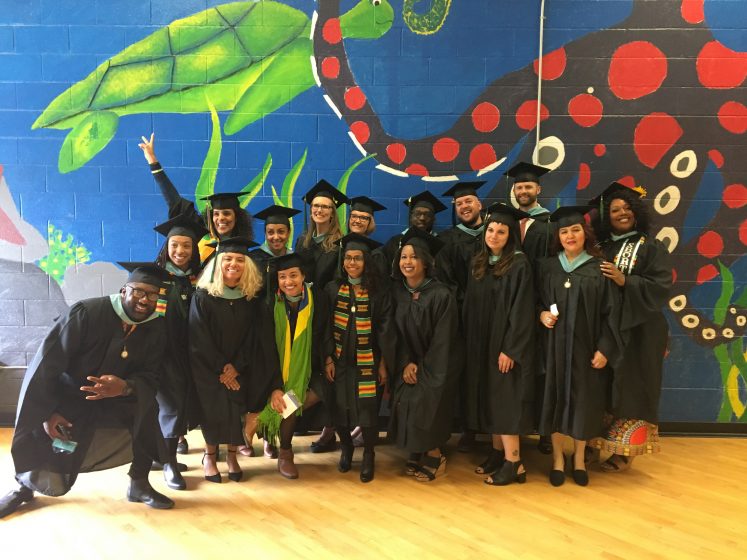Imagine a dance party for two set in an Inglewood, California living room. Thick baselines and the heavy thud of house music, dancehall, reggae, and even Beyonce seep through the walls like honey. In the center of the room the two dancers are swaying and popping to the island rhythms, working up a sweat, and dancing away pandemic blues and quarantine restlessness.
That’s Cynthia Ruffin (Antioch University Los Angeles, BA, ’13) and her partner on a Friday night. Ruffin is creating even while she’s dancing. She’s gathering stories from the quiet voices layered beneath the drums and percussion. Ruffin is revising the stories in her head, crafting the best form to amplify them.
Cynthia Ruffin is a storyteller, and when on a recent Zoom call she told me the story of this two-person dance party, I felt like it captured something about her restless, irrepressible urge to create. But she’s not only a storyteller. She’s a liberation artist, which includes being an actress, playwright, director, puppet-maker, and activist. She brings all of this here to Antioch, where she is studying nonprofit management at the master’s level while also serving as the Community Relations and Recruitment Director of COLORS, a program that offers free counseling services for LGBTQ+ identified youth. Ruffin’s life work includes using her art as a vehicle to amplify marginalized voices—using storytelling to speak for the voiceless, while rooting for, empowering, and representing the underdog.
Learning to Do Right for the Voiceless
Ruffin’s passion for social justice and activism burns like a fervent fire in her belly. That fire was ignited and stoked by her mother. “My mother always talked about doing right,” says Ruffin, “and we were taught to appreciate what we had.” As a child in Montreal, Ruffin was in and out of the hospital. She had been born with a leg length discrepancy and was deemed handicapped. Her orthopedic challenges often made her feel like an underdog. She learned then that people with physical disabilities were oftentimes ignored—or worse—by those who chose not to practice empathy.
She noticed not only the ways people discriminated against her but also against those around her. “I had an uncle with cerebral palsy, and we’d walk everywhere together,” Ruffin explains. “Being with and around people who had no voice or didn’t know how to access their voice—or were assumed to not have a voice due to physical issues in their body—taught me that I could talk to people and tell their stories.”
From an early age, Ruffin realized that speaking for the voiceless through the art of storytelling was one of the ways of “doing right,” like her mother had spoken about. She could use her stories in a way that brought visibility to those who society at large deemed invisible.
Celebrated and Marginal Stories in Hollywood
Ruffin brought this intention with her when she enrolled as a 23-year-old student at the American Conservatory Theater in San Francisco. After graduating from the conservatory and moving to Los Angeles, she found, as a Black actor, that the industry lacked diversity in the stories that were being told. Though there were plenty of talented Black actors to choose from, roles that gave visibility to Black lifestyles and culture were sparse. Positive Black stories and voices were simply being ignored.
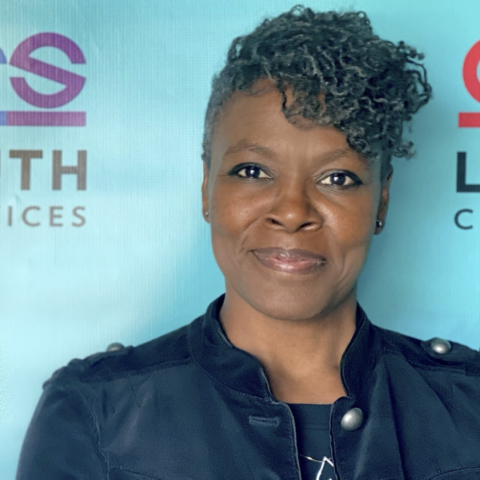
Eventually, Ruffin realized that none of the roles Hollywood was offering truly suited her. The stories being told then did not include people who looked like her, and she refused to compromise her beliefs just to land a role. Ultimately, Ruffin walked away from the industry and began writing herself into the stories she wanted to see. This process would prove empowering for her. Ruffin was able to address issues in her work that spoke to her personally, and write against stereotypical characters and tropes. She ended up exploring her own environment, recognizing there were stories flourishing all around her.
Ruffin discovered some of these stories on the edges of West Hollywood—the “Gay Mecca” of Southern California—where trans women of color often made money as sex workers. Frequently kicked out of their homes for being gay, Ruffin explains that many of these young people would turn to survival sex not only as a way to make money but also for a place to take a warm shower and have a bed to spend the night in if they were homeless. Sadly, sometimes it would be the only semblance to love or intimacy available to them.
Seeing this richness of life on the margins clarified things for Ruffin, and she understood the importance of having activism embedded into her work. “I saw how our stories, while very different, were still so intertwined.” That is, everyone craved visibility, acceptance, and inclusion into a like-minded and supportive community. Ruffin realized that her art could provide that, all while empowering and uplifting the overlooked and marginalized. This objective would become her mission.
A Winding Road to Antioch
In the early 2000s, Ruffin left Los Angeles to live in Santa Fe, New Mexico. She trained with a queer activist circus company, learning stilt walking and how to create larger-than-life puppetry. It was among her colleagues in this circus run by women that Ruffin first met students and graduates of Antioch University. They were activists and artists with missions anchored in social justice, just like her. She decided to look more deeply into the university to pursue her undergraduate education.
Ruffin found herself drawn by Antioch’s rich heritage in activism and social justice. She admired that Antioch had been one of the first educational institutions to allow women to teach at the same level and for the same compensation as men, and among the first to invite Black students to enroll in their programs.
Ruffin enrolled at Antioch and eventually completed her BA in Liberal Studies. Two years ago, she decided to go on to study for a Master’s degree in Nonprofit Management through Antioch University Online. Ruffin will be completing that program this spring.
Theatre as an Introduction to Artist Activism
While at Antioch, she has twice directed the play The Vagina Monologues, has written and directed several plays dealing with social justice, and has had her work published in the anthology Cootie Shots: Theatrical Inoculations Against Bigotry. “I have always been a social activist,” she says, “and being at Antioch confirmed for me that activists who do art are one of the things that is truly needed in the world. I’ve been emboldened to keep on keeping on.”
In 2019, Ruffin, along with AULA faculty Russell Thornhill, organized Antioch faculty, staff, and students to march in Los Angeles’s Kingdom Day parade celebrating Martin Luther King, Jr. To represent Antioch, Ruffin created and carried a larger than life puppet of Coretta Scott King, her way of paying homage to King for her many civil rights contributions—and honoring King as an Antioch graduate.
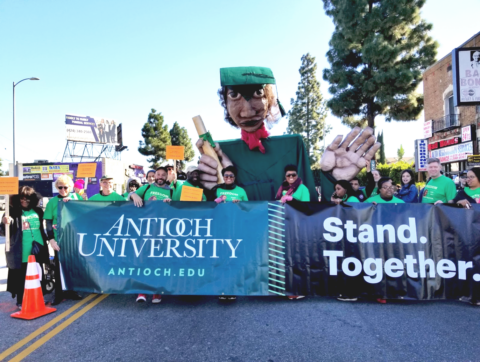
Ruffin understands how storytelling and, in this case, puppetry can be used as a powerful tool to deliver an activist message. “Puppets can spark interest,” she says. “[A puppet] can engage and embody the message, impacting people in a different way.”
Ruffin trained in forum theater with renowned Brazilian social justice theater activist Augusto Boal. He taught her that “forum theater is like a rehearsal for the revolution.” When artistry fuses with activism, that coming together can be a beautiful thing.
For Ruffin, this spark is a matter of connecting to people’s hearts to create art that is emotionally resonant. “Artistry,” she says, “connects to our hearts and speaks what needs to be spoken.” She explains that “my plays contain a message that has to be infused in the work.”
Ruffin makes it clear that first, an audience has to be open to receive. And it is up to the artist to determine the best way to open up their audience. “Laughter makes the heart open,” Ruffin says. “And when you make people laugh, there’s much more energy to be gained. Art activism opens people up to receive the message.”
This was Ruffin’s intention for constructing a puppet in the likeness of Coretta Scott King for the Kingdom Day parade. She wanted to grab the attention of the parade-goers, opening them up to receive her message. Coretta Scott King was also an icon but not always discussed in relation to MLK day. Ruffin chose that opportunity to use a larger-than-life puppet of Coretta Scott King as a catalyst to bring Antioch and its wider community together, thereby sparking conversation.
“Your True COLORS are Beautiful like a Rainbow.” ~ Cyndi Lauper
Along with pursuing a Master’s degree, writing plays, and engaging in artistic activism, for the last two and a half years, Ruffin has served as the Community Relations and Recruitment Director of the COLORS LGBTQ Youth Counseling Service on Antioch’s Culver City campus. COLORS began in 2011 as a student capstone project executed by a student in the LGBT Specialization in AULA’s Master of Arts in Clinical Psychology program. Ten years later, COLORS is still going strong, providing free and unlimited counseling services and support to LGBTQ+ identified youth, empowering them to love themselves, and working to provide them the confidence and encouragement to live meaningful and fulfilling lives. COLORS also provides support to families of LGBTQ+ youth, specifically arming them with the tools needed to actively participate in their children’s lives.
Ruffin, in her position, works to create a safe space for LGBTQ+ identified youth. This space provides visibility, acceptance, empowerment, and inclusion into a like-minded and supportive community. As one of her duties, Ruffin produces and facilitates a virtual Speaker Series moderated by Dr. Tenika Jackson, Director of the LGBTQ Specialization. This academic year, Ruffin explains, the series is looking at issues facing the trans community. The most recent panel featured Black parents of trans identified children, working to re-write the narrative that Black families, by and large, do not accept their queer or trans-identified children. “It was so powerful,” Ruffin says, full of enthusiasm, “and I was so honored to be there.”
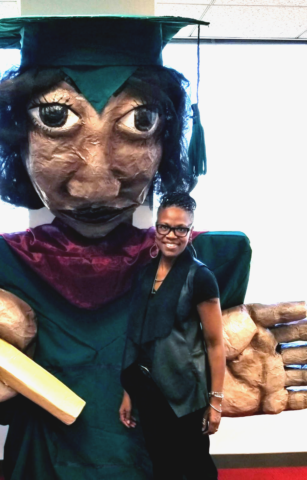
Ruffin has also been navigating COLORS through the unique challenges of our times. Amidst COVID-19, COLORS has been able to transition to remote counseling services, and young people are reaching out for support more than ever. As Community Relations and Recruitment Director, Ruffin sees this as a success. Having gone remote, COLORS is in a position to reach an even wider range of young people, and she wants those who are in need to seek the services that are available.
At the same time, she explains that the rise in need has been caused by the safer-at-home orders that have been implemented since the start of the COVID pandemic in March 2020. “Safer at home isn’t always safer for sexual minority youth,” Ruffin says. “School is the only place sometimes that students can be out about their sexual orientation and gender identity.” This freedom to be one’s authentic self in a safe space is crucial to a young person’s growth and development. The young people who are connected to COLORS recognize the necessity of having this outlet. It has become their lifeline, and they are holding on despite the pandemic.
Ruffin is very concerned about how being stuck at home in close quarters can force some queer youth to deal with domestic violence and physical and emotional abuse in negative and sometimes harmful ways. According to Ruffin, “The Trevor Project recorded that in 2019, over 70 percent of queer identified youth felt depressed more than two weeks at a time. Attempts at suicide are still up. Queer youth are 20x times more likely to attempt suicide, and trans youth are the highest.” These staggering statistics demonstrate that COLORS is more desperately needed now than ever before. Ruffin hopes that through engaging with the services offered at COLORS, queer identified youth will emerge confident and empowered, backed with the support needed to become their best selves.
A Revolutionary Angel Spreads Her Wings
As she completes her Master’s degree, Ruffin has plans to continue her mission of telling the stories of marginalized voices, particularly focusing on QTBIPOC (Queer, Trans, Black, Indigenous, and People of Color) and LGBTQ communities. Ruffin is pouring her energy into Revolutionary Angel Productions LLC, her “mission-driven social justice production company” that will create films, short-form training videos, and other important content. Revolutionary Angel Productions will amplify and give visibility to those voices that don’t get heard, similar to the intent and mission of all of Ruffin’s work.
This summer—assuming travel bans are lifted—Ruffin and her partner (who works as the CEO of Sequoia Speaks) plan to visit Amsterdam in order to attend the Black Europe Summer School conference, which will look at the colonization of Black people in Europe. “We hope to bring back the learning of how we’re connected to the experience Black folks have had with colonization in America,” says Ruffin. “What are the conversations being had about colonization and how it has and continues to affect us? How do they use art as a social justice tool? We just want to bring those conversations together,” she says with a laugh.
Ruffin is gifted at recognizing stories, and she finds them by having many of the necessary conversations—and by not being afraid to ask the right questions. Ruffin is curious about life, passionate about the marginalized, and empathetic and open enough to know that so many of the answers are found in art. The stories are there, waiting to be discovered, and Ruffin has chosen to tell them.

